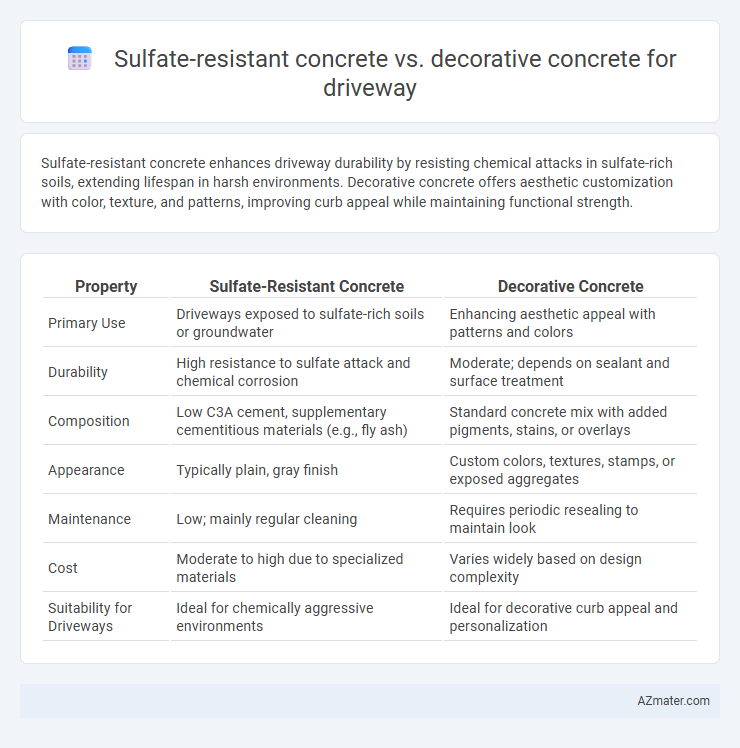Sulfate-resistant concrete enhances driveway durability by resisting chemical attacks in sulfate-rich soils, extending lifespan in harsh environments. Decorative concrete offers aesthetic customization with color, texture, and patterns, improving curb appeal while maintaining functional strength.
Table of Comparison
| Property | Sulfate-Resistant Concrete | Decorative Concrete |
|---|---|---|
| Primary Use | Driveways exposed to sulfate-rich soils or groundwater | Enhancing aesthetic appeal with patterns and colors |
| Durability | High resistance to sulfate attack and chemical corrosion | Moderate; depends on sealant and surface treatment |
| Composition | Low C3A cement, supplementary cementitious materials (e.g., fly ash) | Standard concrete mix with added pigments, stains, or overlays |
| Appearance | Typically plain, gray finish | Custom colors, textures, stamps, or exposed aggregates |
| Maintenance | Low; mainly regular cleaning | Requires periodic resealing to maintain look |
| Cost | Moderate to high due to specialized materials | Varies widely based on design complexity |
| Suitability for Driveways | Ideal for chemically aggressive environments | Ideal for decorative curb appeal and personalization |
Introduction to Driveway Concrete Options
Sulfate-resistant concrete offers enhanced durability against soil and water sulfate attacks, making it ideal for driveways in chemically aggressive environments. Decorative concrete provides aesthetic customization through stamped patterns, colors, and textures while maintaining functional strength. Selecting between these options depends on environmental conditions and desired visual appeal for the driveway installation.
Understanding Sulfate-Resistant Concrete
Sulfate-resistant concrete is specially formulated to withstand high sulfate concentrations in soil and groundwater, preventing chemical reactions that cause deterioration and structural failure. Its low permeability and use of cement types like Type V ensure enhanced durability and longevity for driveways exposed to aggressive sulfate soils. Decorative concrete, while aesthetically versatile with options like stamping and coloring, lacks the chemical resilience of sulfate-resistant concrete, making the latter essential for driveways in sulfate-rich environments.
Overview of Decorative Concrete
Decorative concrete for driveways enhances curb appeal through varied textures, colors, and patterns, offering a customizable and aesthetically pleasing surface. Unlike sulfate-resistant concrete, which prioritizes chemical durability in harsh soil conditions, decorative concrete emphasizes design flexibility and visual impact. Common options include stamped, stained, and polished finishes, all designed to withstand typical driveway wear while elevating property value.
Key Differences in Composition
Sulfate-resistant concrete is formulated with low C3A clinker and supplementary cementitious materials such as fly ash or slag, enhancing its durability against sulfate-rich soils and groundwater environments. Decorative concrete typically uses standard Portland cement combined with various aggregates, pigments, and surface treatments to achieve aesthetic appeal without specific chemical resistance. The key difference lies in sulfate-resistant concrete's specialized mix design aimed at chemical durability, whereas decorative concrete prioritizes visual customization over chemical resilience.
Durability and Longevity Comparison
Sulfate-resistant concrete offers superior durability and longevity for driveways exposed to aggressive soil or groundwater containing sulfates, preventing chemical degradation and structural damage over time. Decorative concrete, while aesthetically versatile and customizable with stains, stamps, and colors, generally requires more maintenance and may be less resistant to sulfate-induced deterioration. Choosing sulfate-resistant concrete ensures enhanced structural integrity and lifespan, particularly in sulfate-rich environments, whereas decorative concrete balances visual appeal with moderate durability.
Aesthetic and Design Flexibility
Decorative concrete offers superior aesthetic appeal and design flexibility for driveways with customizable textures, colors, and patterns that enhance curb appeal. Sulfate-resistant concrete primarily focuses on durability and chemical resistance, making it less versatile in design options compared to decorative concrete. For homeowners seeking visually striking driveways, decorative concrete provides a broader range of stylistic possibilities without compromising structural integrity.
Performance in Harsh Environments
Sulfate-resistant concrete offers superior durability in harsh environments by resisting chemical attacks from sulfate-rich soils and groundwater, ensuring long-term structural integrity for driveways. Decorative concrete, while aesthetically versatile with finishes like stamped or stained surfaces, generally lacks the enhanced chemical resistance needed for aggressive conditions. Choosing sulfate-resistant concrete significantly improves performance by minimizing deterioration and maintenance costs under sulfate exposure.
Installation and Maintenance Needs
Sulfate-resistant concrete requires specialized installation techniques, including the use of low-permeability cement and careful curing to prevent sulfate attacks, ensuring durability in aggressive soil conditions. Maintenance for sulfate-resistant concrete driveways is minimal, focusing primarily on sealing cracks promptly to maintain structural integrity. Decorative concrete demands meticulous surface preparation and skilled application of stains or overlays, with maintenance involving regular sealing and cleaning to preserve aesthetic appeal and prevent surface wear.
Cost Analysis: Sulfate-Resistant vs Decorative
Sulfate-resistant concrete typically costs 15-20% more than standard concrete due to specialized cement additives designed to resist sulfate attack, making it ideal for areas with high soil sulfate content. Decorative concrete, while often more expensive upfront due to staining, stamping, or engraving, varies widely depending on design complexity, with premium finishes increasing costs by up to 30-50%. When comparing the two for driveways, sulfate-resistant concrete offers long-term durability savings in sulfate-rich environments, whereas decorative concrete prioritizes aesthetic value with variable pricing linked to customization.
Choosing the Best Concrete for Your Driveway
Sulfate-resistant concrete is ideal for driveways exposed to soil or groundwater with high sulfate concentrations, preventing structural damage and ensuring durability in harsh environments. Decorative concrete offers aesthetic versatility with options like stamped patterns, stains, and overlays, enhancing curb appeal while maintaining functional strength. Choosing the best concrete depends on environmental conditions and design preferences, balancing durability requirements with visual impact.

Infographic: Sulfate-resistant concrete vs Decorative concrete for Driveway
 azmater.com
azmater.com